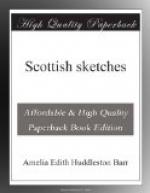“Davie, sit a moment, you dear lad. I hae a word to say to ye. I hear tell that my lad is drinking far mair than is good either for himsel’ or his business. My lad, I care little for the business; let it go, if its anxieties are driving thee to whiskey. David, remember what thou accused me of, yonder night, when this weary mill was first spoken of; and then think how I suffer every time I hear tell o’ thee being the warse o’ liquor. And Jenny is greeting her heart out about thee. And there is thy sick wife, and three bonnie bit bairns.”
“Did Isabel tell you this?”
“How can she help complaining? She is vera ill, and she sees little o’ thee, David, she says.”
“Yes, she is ill. She took cold at Provost Allison’s ball, and she has dwined away ever since. That is true. And the house is neglected and the servants do their own will both with it and the poor children. I have been very wretched, Uncle John, lately, and I am afraid I have drunk more than I ought to have done. Robert and I do not hit together as we used to; he is always fault-finding, and ever since that visit from his cousin who is settled in America he has been dissatisfied and heartless. His cousin has made himself a rich man in ten years there; and Robert says we shall ne’er make money here till we are too old to enjoy it.”
“I heard tell, too, that Robert has been speculating in railway stock. Such reports, true or false, hurt you, David. Prudent men dinna like to trust speculators.”
“I think the report is true; but then it is out of his private savings he speculates.”
“Davie, gie me your word that you wont touch a drop o’ whiskey for a week—just for a week.”
“I cannot do it, uncle. I should be sure to break it. I don’t want to tell you a lie.”
“O Davie, Davie! Will you try, then?”
“I’ll try, uncle. Ask Jenny to go and see the children.”
“’Deed she shall go; she’ll be fain to do it. Let them come and stay wi’ me till their mother is mair able to look after them.”
Jenny heard the story that night with a dour face. She could have said some very bitter things about Deacon Strang’s daughter, but in consideration of her sickness she forbore. The next morning she went to David’s house and had a talk with Isabel. The poor woman was so ill that Jenny had no heart to scold her; she only gave the house “a good sorting,” did what she could for Isabel’s comfort, and took back with her the children and their nurse. It was at her suggestion John saw David the next day, and offered to send Isabel to the mild climate of Devonshire. “She’ll die if she stays in Glasgo’ through the winter,” he urged, and David consented. Then, as David could not leave his business, John himself took the poor woman to Torbay, and no one but she and God ever knew how tenderly he cared for her, and how solemnly he tried to prepare her for the great change he saw approaching. She had not thought of death before, but when they parted he knew she had understood him, for weeping bitterly, she said, “You will take care of the children, Uncle John? I fear I shall see them no more.”




